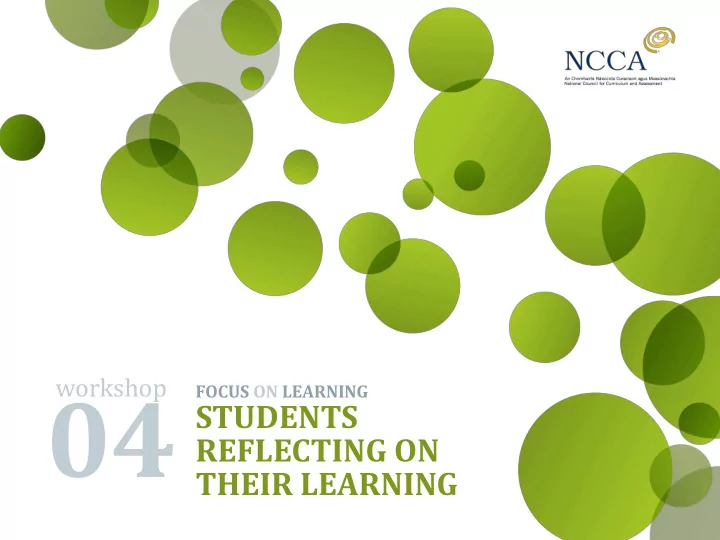

workshop 04 FOCUS ON LEARNING STUDENTS REFLECTING ON THEIR LEARNING
In this unit we are learning to …. • discuss the role of reflection as an important part of learning • identify strategies that will help students to reflect on their learning
Why is reflection important? • Encourages students to take responsibility for their learning • Raises students’ awareness of the knowledge and skills that they are gaining • Increases self-esteem • Develops students’ capacity to recognise quality in their work • Contributes to the key skills in Junior Cycle particularly Managing Myself and Staying Well
Reflection develops metacognition Metacognition is the process of being aware of one ’ s learning and thinking processes through self-monitoring. It focuses the student ’ s evaluation on his or her performance rather than in comparison with others which we know is more likely to maintain motivation. ( Assessment, Stobart and Gibbs 1997, pg 17)
Why promote student reflection? 'When there is one teacher and thirty students and all the feedback comes from or through the teacher, there is no hope of providing sufficient good quality feedback.' Ian Smith (2004)
How peer assessment/peer feedback can support student reflection? • Feedback is in language that the students use • Strengthens the student voice in the classroom • Can produce valuable feedback
It ’s more than correcting…. ‘ Engaging in peer and self-assessment is much more than checking for errors or weaknesses. It involves making explicit what is normally implicit and thus requires the student to be more active in their learning. The students become more aware of when they are learning and when they are not. ’ - Black & Wiliam: Working Inside the Black Box
Students can reflect on their learning when they: • Write about their learning • Talk about their learning • Make a video diary about their learning journey • Set goals about their learning • Use peer/self-assessment “ We do not learn from experience... we learn from reflecting on experience. ” Dewey
Students can reflect … • At the beginning of the class • As they progress through a topic • At the end of class or a series of lessons
The Experiential Learning Cycle Rolfe, Freshwater and Jasper (2001)
Preparing students • Share learning intentions and success criteria • Model the assessment and feedback processes • Build the right climate
Self-assessment Students reflect Students reflect about what they about how they have learnt have learnt
Suggested strategies to help make it work • Make it routine • Give learners the information they need • Keep it varied • Remember, that like all skills, it takes time to develop • Focus on strengths • Make it lead somewhere • Explain it to parents
Discussion • In groups discuss the points mentioned on the previous slide. • How might you include these strategies in your classroom? • What else would you add to these pointers?
Recommend
More recommend